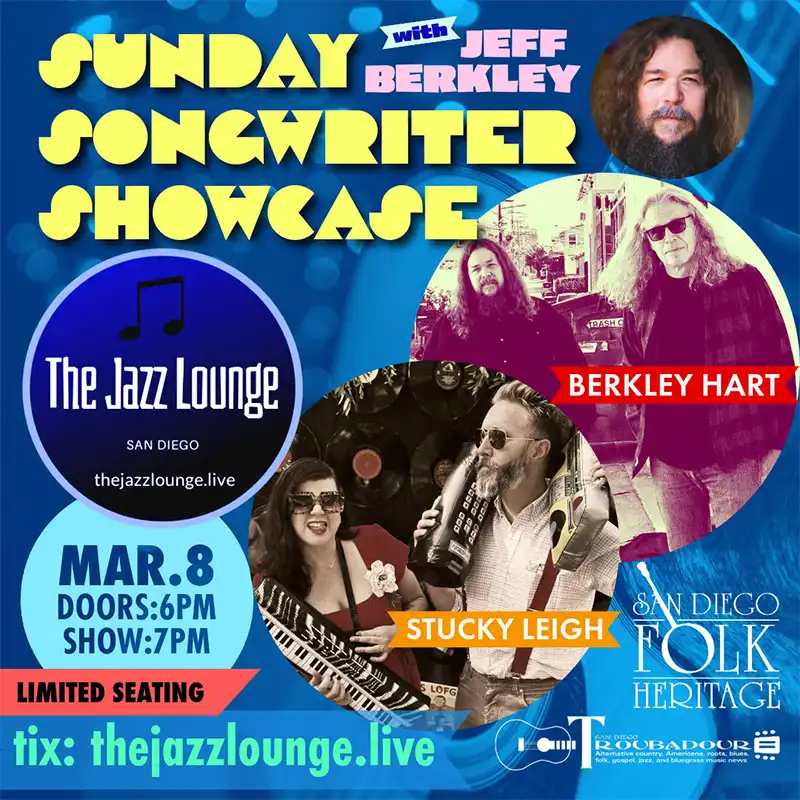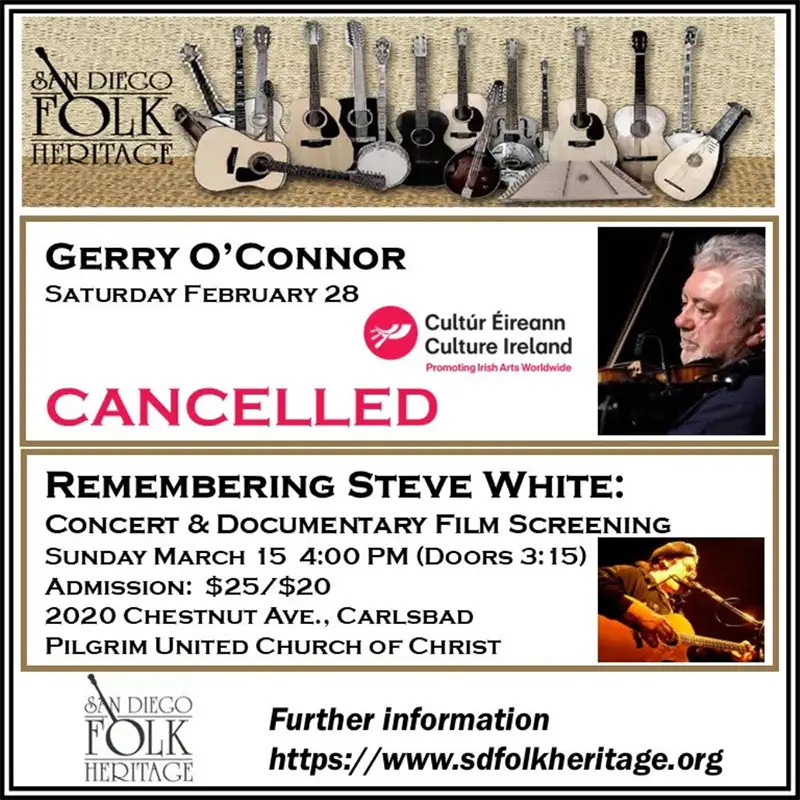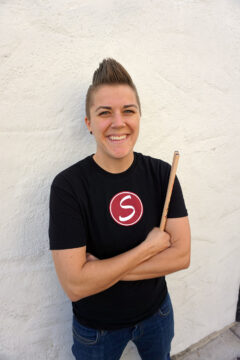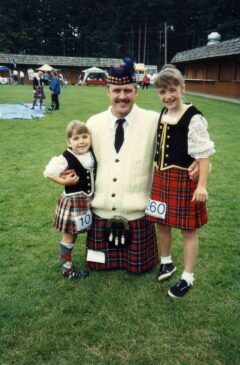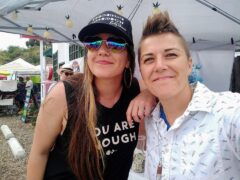Featured Stories
Becoming Jules Stewart
I follow drummer Jules Stewart on Instagram (@adventuresofjj). A few months ago, she asked people to tell her one of their favorite albums so she could expand her musical knowledge. She then posted her own little mini reviews of each album (captured as one of the highlights on her IG page). I remember thinking it was a cool idea and the fact that she actually did listen was equally cool. But she didn’t just listen, she took in the music and delivered generous praise and honest critiques. Her enthusiasm about discovering this new-to-her music was deliriously wholesome.
So, when I was interviewing her for this article, I was delighted to learn that she did the same thing to friends in high school. It was an insight to her personality that was echoed by a couple of her current bandmates: that she is always trying to find ways to grow and learn, to become a better version of herself.
From a Wee Bairn (Since She Was a Child)
The first thing you should probably know about Stewart is she comes from Scottish stock. And although you would have to “go back many generations” to find the last of her Stewarts that were born in Scotland, the heritage and the ancestry were very important to her father who made it important to his family, mostly by way of music. Stewart explains, “I was surrounded by Scottish music, went to the Scottish Highland Games, and listened to my dad practicing the bagpipes. My older brother and sister and I were encouraged to pick a Scottish activity to participate in. I started Scottish Highland dancing when I was four years old. When I was eight, I decided the Scottish snare drummers were really having more fun than I was, and I asked my parents if I could do that instead. I joined a kids’ pipe band and took some lessons and eventually made the switch to a drum set at about 12 years old.”
Scottish Highland dancing is similar to Irish step dancing (think Riverdance) except the Scottish dance uses the hands more. I like the picture in my mind of child Stewart in a kilt dancing to bagpipe music. But I think I would love to see her in line with the snare drummers behind the bagpipers (and still in a kilt). Besides the snare and drum kit, she also took up guitar around that time.
Growing up in Renton, Washington, a suburb of Seattle was not always pure dead brilliant (Scottish slang for ‘exceptionally good.’) Recalls Stewart, “I was home schooled so I spent a good chunk of my childhood missing some key things…like that song everyone learns that has all the states in it? Yeah, never learned that. Also cursive. Missed that. Friends? Not quite enough of those. My family was (and in great part, still is) very religious and conservative—culturally—and that’s something I still feel like I’m unpacking through my adult life.
My parents swear that being home schooled was my idea, but I remember it being more that they didn’t really want me in public school and didn’t like the teacher I would have had at the Christian school nearby. I think the answer that makes the most sense is that they wanted me to have more of a controlled education with a Christian world view. Oops, I still turned out gay.” More about that twist later.
When it was time for high school, Stewart begged her parents to let her attend public school, and they acquiesced. It was, to put it mildly, mind-blowing. “It was like an explosion of new experiences and people at every moment.” And here is where Stewart continues to grow in her musical education. “In 9th grade I used to walk around with a piece of paper asking people to write their favorite songs down. I’d find them and listen to them, then repeat the process. My brain almost couldn’t handle the wonder of so many cool new experiences at once. I took as many music classes as I could: concert band, percussion, and AP music theory. I loved it!”
Beyond discovering new music and learning more about theory and playing, Stewart was also an athlete in high school, either for the school or with club teams, playing, at various points, soccer, rugby, basketball, track and field, softball, and even bowling. Playing rugby in high school led to a team trip to England and Wales though that wasn’t her first trip abroad. She’d already been to Turkey as part of a mission trip with her church. Of that experience, Stewart has mixed feelings but reflects on it from an enlightened point of view, another indication that she continues to learn about herself. “I had a great time, but I feel such a weird set of emotions looking back on it now. I recognize how white saviorism plays into the mindset of “global missions” that many churches have. I, too, thought that my team could go “help out” in Turkey. I really believe lots of what churches do in terms of mission trips comes from a place of wanting to help, wanting to contribute. That’s a natural thing for humans to want to do. But if it’s not matched with a true understanding of our place in the world and humility, it’s dangerous and destructive. I’m sad I was a part of that whole attitude.”
Failing Means Yer Playin! (When You Fail at Something, at Least You’re Trying)
After high school, there was no question that Stewart would continue with her education, as her parents made it clear that higher education was “a non-negotiable expectation.” She had a dream to play NCAA Division I soccer so she chose Arizona State University and walked on to the soccer team. “I loved playing college soccer! I worked really hard and found a coach that valued academics and character as much as skill on the field. It was a super rewarding experience to push myself to the very edges of my capabilities. I got a few minutes of playing time in my first two years then quit the team to deal with my mental health which is a decision I still feel a lot of peace about. The process of uncoupling from my super conservative upbringing and starting to understand my sexuality was a tough one and I needed more time to handle it all well.”
Geeza Haun (Give Me a Hand)
As Stewart began to “uncouple” from how she was raised while grappling with her sexual identity, she turned to a source of strength and comfort: her friends. “I started coming out to friends when I was about 23. The friends I grew up with in church were not altogether very accepting of me being gay, but most of my other friends have been wonderful and unconditionally loving, even when they had to work hard to integrate their love for me with their beliefs.” Even now, she needs look no further than her chosen family. “I am SO LUCKY to have the very best friends on earth in my life. They have definitely been with me through everything life has brought. I’ve processed grief, learned about myself, been challenged in my views, and have evolved into a better person with, and because of the influence of, my friends.” The reaction of her family was less than ideal except for her sister. “My sister and her husband have been beyond supportive. They’ve been champions for me in the family and in society and have heaped love on me since the moment I came out.” Through it all, Stewart loves where she is. “I’m so grateful for the thought and effort I’ve put in to accept and love myself for who I am; it has made my life so much richer and deeper. I’m truly happy.”
Away Ye Go to San Diego
Stewart’s story veered from the Southwest to America’s Finest City where she arrived about 10 years ago. “I moved from Phoenix to San Diego to start grad school for physical therapy at San Diego State. I started pursuing that to stave off the existential crisis of not having a life plan. My first few months in San Diego, I went on a walk almost every single day and fell in love with the city.”
Part of falling in love with the city was the music scene. In the past, she had her fair share of “less than ideal experiences” when it came to being an androgynous female percussionist. She’s been “treated less seriously, kicked out of bands for being female, been told I had to wear makeup to stay in a band, and a few other little things.” With her hard-won optimism and self-respect, she notes, “All in all, when those things happen, I know it’s just not the band for me. I feel grateful I’ve found my place in a community of musicians that see my musicality first.”
The feelings of her fellow musicians are mutual. Both Lindsay White and Marlo Smith (Golden Howl) credit Rock ‘n’ Roll Camp for Girls San Diego for their introduction to Stewart. White dubs Stewart as an “ideal bandmate,” saying, “In addition to being extremely talented and technically skilled, she shows up practiced and prepared, and she takes direction just as well as she gives great input. It doesn’t matter what project she’s playing with, or where she’s situated on stage, or what her instrumentation set-up is; no one in the venue has any doubt that she thoroughly enjoys every second of every gig.” Smith echoes that sentiment. “Jules is very present when she plays. She has such mastery over her instrument but is able to stay present with an entire band at the same time. She is a focused, consistent, and trustworthy drummer. She is equally amazing live and in the studio. She, quite literally, doesn’t miss a beat.”
Whit’s Fur Ye’ll no Go by Ye! (What’s Meant to Happen Will Happen)
Aside from playing and recording with multiple bands, including Love Angeles, Golden Howl, Lindsay White, Chris Avetta, Claire Walding, Lizabeth Yandel, Amy Day, Caitlin Jahn, The Veer, and Seth Faergolzia, Stewart worked in physical therapy and dabbled in graphic design. Graphic design started out as a hobby for her about 15 years ago, but she has been putting in time and energy to learn more through courses and projects. Then along came 2020, and well, things changed. Even though she’d earned her doctorate degree in physical therapy, Stewart was already certain that it was not her future; she wanted to pursue music full time as well as explore her graphic design work. She had actively been planning this change, “slowly building up my gig and recording schedule for the past few years until I was ready!” while diligently working until her student loans were paid off, which happened right around March 2020. With the pandemic, Stewart explains, “I stayed [at her job] for a while longer to make some money to be able to help out some friends who immediately lost 100% of their income, then left my job at the end of August 2020.” To make a living since live music was shut down, Stewart took on graphic design projects and started teaching music online, yet another new facet for her that she embraces. “I have been teaching at San Pasqual Academy for about a year (mostly virtually) and I teach drums, guitar, piano, and some vocal lessons. That’s been something that has really stretched my ability and taken me out of my comfort level. Most of the students I work with are “beginners” and many are incredibly musically minded. I have learned so much from the process of teaching instruments on which I don’t consider myself excellent. My biggest goal is that every student walks away from their lesson feeling encouraged, proud of themself, and excited to play music. If these students feel confident to return to their instrument years down the road, I think that’s a huge win for everyone!”
Stewart has also used her time during this live music stoppage to complete her drum tracking/remote recording set-up so she is able to record drums from her studio safely. She recently contributed drum tracks for Lindsay White’s newest singles. “I recorded the drum parts myself in my studio with my own equipment and then sent the tracks to the producer for each song.” Though the process of learning the gear and how to record herself has been gradual, it’s been worth it. “It’s incredibly cool to still get to safely record on beautiful music during a pandemic. I’ve done the same process for a film score and music for a bunch of other people this year!” Some of those “other people” include Ted Stern, Bonnie Nicholls, Jimbo Scott, a collaborative Lady Brain project, and work on a project for the Love Angeles. She frequently posts videos of herself working on different things on Instagram.
Along with the pandemic came a renewed and more fervent movement toward social justice set off, in part, by the murder of George Floyd by a Minneapolis police officer. Stewart, who called herself “a lukewarm advocate for racial justice” prior to the summer of 2020, took the call for white people to examine their privilege seriously. “I’ve immersed myself in workshops, books, and conversations to help me understand how complicit I have been in this madly oppressive system. I’m still changing, but I’ve become a lot more attentive to Black leadership and more outspoken in my own life circles. I have lots more to learn and a lot more growth ahead, and I always want to continue to root through my own biases and heart to work toward dismantling the illusion of white supremacy.” Stewart couples this work with her drive for gender equity. “I’m also passionate about improving opportunities for women and non-binary people, both in the creative/art realm and across other industries. I would love to live in a world where people of any gender feel empowered, safe, and supported to pursue and achieve any goal.” She credits Lindsay White’s social justice and gender equity goals with Lady Brain as well as Julian Guthrie’s startup, Alphy, (for which Stewart does graphic design) for inspiring her to keep doing the work.
Lang May Yer Lum Reek! (May You Live Long and Stay Well)
Now that folks are getting vaccinated, and most of us seem to be getting primed for our post-COVID lives, Stewart is looking forward to…what else? Live music. “I really believe music is only made complete when it’s shared with other people, so I’m really looking forward to playing for an audience again. It’s so special to feel and see people connect with the music the band is making in real time, and I’m really excited to experience that again! Everything is tentative at this point, but even hearing whispers of tours and shows makes me happy.”
Looking even further ahead, when the pandemic is, hopefully, far behind us, Stewart is less certain. “My brain doesn’t necessarily have an easy time picturing how life might go, but I do have big goals and dreams. If five years from now and beyond I’m making a living touring, gigging, and recording on drums, I’ll be a happy camper. Growth and progression are hugely important to me. I always strive to get better so I can be prepared to play the best music with the best musicians for as many people who connect with that music as possible.” And one thing is for certain. She’ll rely on her friends, plus everyone in the San Diego music community, to help her get there. “My friends are like a chosen family, and they’ve been so, so kind and encouraging through the highest and lowest points of this wild life. I’m also so grateful to have found the little spot I fit in this beautiful music community. I appreciate so much all the drummers and all the musicians I’ve had the privilege of meeting; it really does feel like a family that I’m proud to be part of. I feel surrounded by an army of people willing to fight for me!”
For Jules Stewart, the phrase, “it’s not about the destination, it’s the journey” really rings true. “This crazy year I’ve learned (and am still learning) to trust and know my own voice as a drummer and a graphic designer. I’ve learned that I have valuable things to add to the conversation, whether musically or visually, and can speak without speaking over anything or anyone else. Growth is one of the things I value most in life, so everything I do works toward some sort of growth. Whether it’s emotional or mental or technical, I always want to be pursuing growth of some sort, no matter how uncomfortable that might be.”
And how lucky for us that we have a front row seat to watch Jules Stewart becoming more and more herself.





